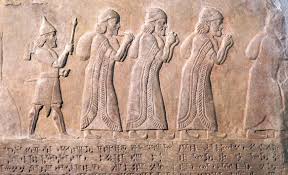Sermon on Deuteronomy 4:1-2, 6-9 offered to the people of the Church of the Redeemer in Bryn Mawr, Pennsylvania.
The latest issue of Commentary magazine includes an article by Michael Lewis called “How Art Became Irrelevant.” Lewis, who is a professor at Williams College, begins this elegy by describing a recent incident in one of his classes. He had just shown his students “Shoot,” a performance piece in which artist Chris Burden orders a friend to shoot him through the arm with a .22 caliber rifle.  This piece was the first example of what came to be known as “endurance art,” an unnerving genre in which the performer subjects himself to pain, tedium, or deprivation. After viewing a clip of Burden’s seminal work, Lewis’ students exhibited none of the shock or revulsion one might expect from a group of people who had just witnessed the spectacle of someone being shot on camera. Indeed, the handful of students who responded at all only worried about the shooter’s legal liability. No one responded with anger or even discomfort. No one gave voice to the fact that Burden’s piece had committed a violation against human dignity in some way. In other words, no one was willing to pass judgment.
This piece was the first example of what came to be known as “endurance art,” an unnerving genre in which the performer subjects himself to pain, tedium, or deprivation. After viewing a clip of Burden’s seminal work, Lewis’ students exhibited none of the shock or revulsion one might expect from a group of people who had just witnessed the spectacle of someone being shot on camera. Indeed, the handful of students who responded at all only worried about the shooter’s legal liability. No one responded with anger or even discomfort. No one gave voice to the fact that Burden’s piece had committed a violation against human dignity in some way. In other words, no one was willing to pass judgment.
Michael Lewis sees this classroom incident as the signal of a larger trend. When it comes to art, he argues, contemporary society has become so tolerant, so broadminded, so unwilling to be discerning that it has become largely indifferent to the work of artists. Lewis suggests that this indifference is a consequence of the fact that over the last 100 years artistic movements have been so anxious to rebel that they forgot what they were rebelling against. His prognosis is grim: “While the fine arts can survive a hostile or ignorant public, or even a fanatically prudish one,” he writes, “they cannot long survive an indifferent one.” This indifference is not limited to the arts. In our culture’s honest and worthy effort to be tolerant, we are no longer willing to identify what is true, and this has very real consequences for the way we live. It has led us to forsake relationship for social network, enlightenment for spectacle, discernment for blithe disengagement. No longer are we willing to be challenged. No longer are we willing to engage anything with honest curiosity. Instead, the primary posture of our age is one of disengagement and apathy. In our dogmatic effort to avoid the appearance of judgment, we have abandoned the possibility of discernment.
The passage we read from Deuteronomy this morning addresses this condition. We tend not to pay much attention to the book of Deuteronomy. Though it is part of the Torah and thus has a privileged place in the Hebrew Bible, Deuteronomy is not likely to make many people’s “favorite books of the Bible” lists. For one, it has none of the exciting stories of death and liberation that we get in Genesis and Exodus. Moreover, it covers material we’ve already seen. The name “Deuteronomy” comes from the Greek for “second Law,” and that’s exactly what the book is: a recapitulation of the law that has already been articulated in Leviticus. Nevertheless, Deuteronomy remains a crucial component of both the Jewish and Christian narratives. In fact, it is the book of the bible that Jesus quotes most frequently in the gospels. This raises an interesting and important question: what it is that makes this repetitive book of Laws so compelling?
To answer this, it’s important for us to remember that the books of the bible were not written or edited together at the same time. The writers of Leviticus probably did not know the writers of Deuteronomy.  As a result, each book can be placed in context and given a historical frame that guides the way we read the text. Deuteronomy’s context, in particular, is crucial to our understanding of the book. Most scholars agree that Deuteronomy entered the Jewish community during the exile, the time when the people of Israel were removed from the land God promised to them. The exile was a time of great soul searching, a time when God’s people wondered where they had gone wrong, a time when they reached back into their traditions to remind themselves who they were.
As a result, each book can be placed in context and given a historical frame that guides the way we read the text. Deuteronomy’s context, in particular, is crucial to our understanding of the book. Most scholars agree that Deuteronomy entered the Jewish community during the exile, the time when the people of Israel were removed from the land God promised to them. The exile was a time of great soul searching, a time when God’s people wondered where they had gone wrong, a time when they reached back into their traditions to remind themselves who they were.
This is what is happening in the reading we heard this morning. The people of Israel are being reminded that they are a wise and discerning people, that unlike the nations of the world, they have a Law that is the symbol of God’s claim on them, that they have a God who is closer to them than their own breath. In the midst of this congratulatory language, however, there is a poignant hint of warning, an almost wistful note of lament: “But take care and watch yourselves closely, so as neither to forget the things that your eyes have seen nor to let them slip from your mind all the days of your life.” In the context of the exile, these are words of regret. “This is where we went wrong,” the people listening are meant to say, “this is why we have been removed from our homeland and from everything we have ever known: because we have allowed these things to slip from our minds.” Interestingly, this passage does not suggest that the exile occurred simply because Israel failed to follow the statutes and ordinances that had been set before them, but because they had forgotten how near God was when they called upon the LORD. Israel was in exile because they had become indifferent to God’s presence among them. They had replaced the living God with totems made of wood and gold, they had abandoned true devotion for the spectacle of idol worship, they had given up wisdom for the sake of easy answers. This passage from Deuteronomy calls God’s people to discernment, which is not about labeling things “good” or “bad,” “sacred” or “profane,” but is instead about remembering the indescribable nearness of our God.
A few days ago, Alison Parker and Adam Ward, two journalists from an ABC affiliate in Virginia, were shot to death during a live broadcast. Just after pulling the trigger, the murderer sent a chilling fax that read, “I’ve been a human powder keg for a while….just waiting to go BOOM.” Whatever his motives, this gunman saw these innocent victims as part of a grim spectacle through which he would make himself and his particular issues known to the world. While many have expressed their shock and revulsion at this senseless act of violence, the fact is, events like this are what tends to get noticed in our culture today. Those who crave our attention rely more and more on empty, and in some cases, violent spectacle to hold it. The age we live in is desperate for a spirit of discernment. Discernment is not judging one thing to be better than another; discernment is about determining what is worth our attention. And as people of faith, we are called to devote our attention to what is true, what is real. We are called to remember the indescribable nearness of God and embrace the transforming reality of God’s presence. In large part, this is what we attempt to do every time we gather for worship. The primary purpose of our liturgy is not to entertain, distract, or even edify; it is meant to articulate something real. During the hour or so we gather on Sunday mornings, we lay aside cliche and doubletalk and strive for the rarest of goals: to mean exactly what we say. While this may not seem like much, it is profoundly countercultural, it is the core of what it means to be a Christian, it is the embodiment of what it means to remember the nearness of God, and it can change the world.